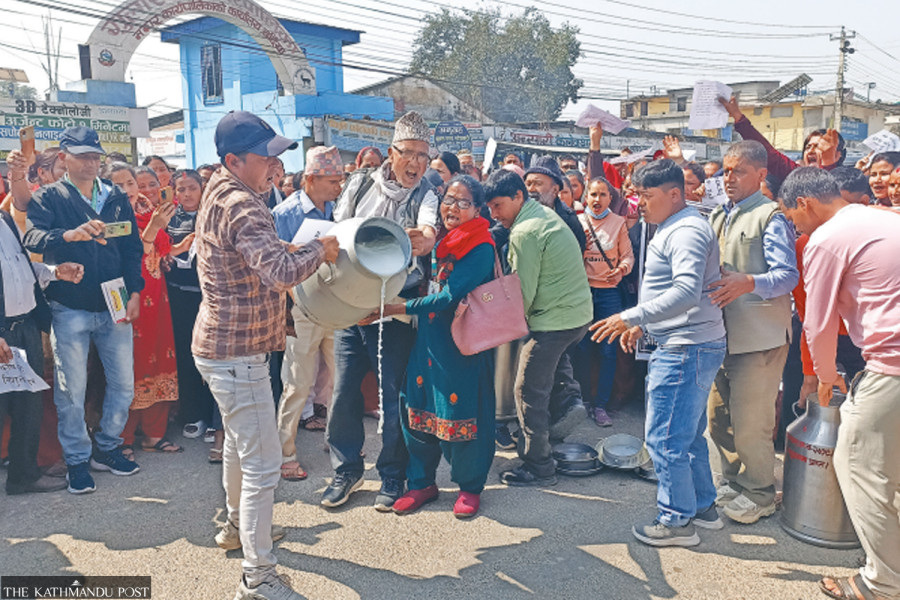National
Troubled dairy farmers seek government support
The state-owned Dairy Development Corporation has sought bailout funds amounting to Rs300 million to pay the protesting farmers.
Post Report
Binod Kumar Lamichhane is having great difficulty managing the daily expenses of feeding his cows as he has not been paid for months for the milk sold.
Lamichhane, a proprietor of two cow firms—Big Agriculture in Helambu, Sindhupalchok and KNB Farm Industries, Manahara, Kathmandu—said that a private dairy has not paid him Rs350,000 dues for the last two months.
He owns 59 cows and buffalos on his two farms, producing 500 litres of milk daily.
Lamichhane has invested Rs40 million in his farm established seven years ago.
“I cannot buy feed providers as they deal in cash. On the other hand, I have not been paid for the milk I supplied to a private dairy.”
The economic slowdown has turned Nepal’s dairy industry and farmers upside down, with problems ranging from plummeting sales to livestock feed becoming expensive.
The problems have compounded after dairy producers halted payments to hundreds of farmers across the country, for over six months.
“We have to buy composite feed, silage, paddy straw, vitamins and veterinary services regularly. They are not available on credit,” said Lamichhane, who has joined the group of farmers who started a protest earlier this week.
“I have a loan of Rs35 million, and I am worried about how to repay it. I sold my wife’s jewellery to manage the expenses for animal feed. But what next?” he questioned.
On February 22, the National Peasants' Coalition Nepal, a farmers’ organisation, announced a protest against the government. The representatives of farmers, particularly commercial ones, from all seven provinces, have descended on Kathmandu.
Amid ongoing protests, the state-owned Dairy Development Corporation has sought bailout funds from the government.
“We have received a request letter from the corporation to provide them with a loan amounting to Rs300 million. Accordingly, we have requested the finance ministry to arrange the bailout fund,” said Sabnam Shivakoti, spokesperson for the Ministry of Agriculture and Livestock Development. “The finance ministry, which is studying the loan proposal, looks positive.”
“Hopefully, the fund will be released next week.”
In its letter, the corporation said that due to low sales, dairy products have been piling up. As a result, they were unable to pay the farmers. The corporation has also said that from April onwards, demand for milk and dairy products would increase and sales pick up.
“The proposed fund would address the corporation’s financial crisis to some extent,” said Shivakoti.
The dairy sector said in a recent statement that it has been hit by the ongoing economic crisis.
The state-owned corporation’s payments due to farmers, especially those in eastern Nepal, over two months total Rs950 million.
The National Peasants' Coalition Nepal claimed that the corporation and private dairies owe Rs6 billion to farmers across the country.
“The government has assured us that we will get our payments, but nothing has happened yet,” said Ganesh Chandra Timilsina, president of National Peasants' Coalition Nepal.
“The protest will continue until farmers get their payment.”
As a part of the protest, the association has already submitted a memorandum to political leaders and the representatives of local governments.
The issue has been raised in Parliament too.
“As part of our extended protest, we have planned a sit-in at Maitighar Mandala, a no-go zone for protesters, on March 4,” said Timilsina. “Hundreds of farmers will assemble at Maitighar demanding their money.”
The sit-in would continue until the farmers are paid.
Farmers say they have been badly hit by the lumpy skin disease. More than 50,000 cattle died from the lumpy skin disease that affected all of the country's 77 districts last year, causing billions in losses to the farmers.
“At this time, if not paid, we will be completely ruined,” said Lamichhane.
According to Lamichhane, most of the small farmers in his area in Sindhupalchok are unpaid—in the range of Rs100,000 to Rs200,000—for five months. He said that the banks have started issuing notices for commercial dairy farmers after they failed to pay loans.
“Everyone is in deep trouble.”




 10.55°C Kathmandu
10.55°C Kathmandu














